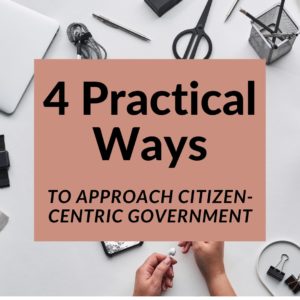Four Practical Ways to Approach Citizen-Centric Government

Citizens have high standards when doing business with private entities. They approach government interactions with the same high standards. Implementing a citizen-centric government is no simple task. You could make a career out of analyzing and improving government services. In fact, many of Momentum’s consultants have done just that and specialize in the public sector!
Governments have unique policy and political constraints that private companies don’t have. Still, the push toward citizen-centric government seeks to raise the quality of government services to meet modern citizens’ needs. Public agencies can begin implementing citizen-centric practices by gathering data on their processes, investing in customer service training, removing red tape, and increasing citizen access to their information.
Practical Ways to Implement Citizen-Centric Services in Government
Momentum’s unique role in serving both private and public sector companies has given us practical insights into how agencies can transform their services to citizens and improve the government-citizen relationship.
1. Map the Current Citizen Journey
While some government agencies have taken (and continue to take) great strides toward a citizen-centric approach, others are unclear on where to start. You can’t improve what you don’t know. The first step in implementing a process change is to conduct an in-place study to gather data on the existing process. This data on the citizen journey, which refers to the steps a citizen takes from the time they need a government service until the transaction is completed, provides insights into areas for improvement.
For example, a business development office with a mandate to improve its services might first conduct customer feedback surveys with citizens applying for a business license. How do they feel about the level of service received? How easy or difficult was it to complete the transaction, and how long did it take? Were all of the steps in the process clear?
Agencies also need to understand the citizen journey to create a clear picture of the entire existing process. It’s easy to think that a process is simple when it’s really much more complicated. Momentum staff once helped a government agency map out a seemingly simple process that wound up taking up an entire conference room wall from start to finish. If agency staff need an entire wall to understand a process, imagine how difficult it would be for a citizen to navigate their transaction to completion. Mapping the citizen journey is critical to creating a citizen-centric process.
2. Remove Bureaucratic Red Tape
Civil servants and citizens alike understand the frustration of a seemingly trivial problem preventing them from completing a transaction. For example, government employees can’t issue permits or licenses if the customer provides the wrong paperwork. In other situations, government offices may have inconvenient hours for their customers, or customers are unclear on how to make an appointment with the right department.
Government agencies have unique responsibilities that their private sector counterparts do not have, which means they have specific policy and political constraints. Achieving a citizen-centric government requires creative solutions to balance government responsibilities with the need to provide modern, accessible, and transparent services to citizens with changing needs. Agency leaders must look for areas to reduce the “red tape” in completing transactions, such as eliminating information silos and promoting collaboration across departments and other agencies.
3. Invest in Excellent Customer Service Training
Excellent customer service determines which companies succeed and which ones fail. Public agencies are no exception to this requirement for providing the best customer experience. Although government services are not driven by the same market competition as the private sector, a citizen-centric government inherently requires a commitment to providing the same high level of service expected from private companies.
Citizen-facing civil servants at the counters or on the phones aren’t the only ones who should be trained in good customer service. Customer service is a skill that can be taught, and offering training to all employees helps everyone understand their role in affecting the customer experience. Even employees who do not normally face citizens or customers, from IT personnel to budget analysts, should be trained in providing good customer service to understand how they impact the citizen journey. Momentum has experience providing customer service training to government clients, offering training to both citizen-facing workers and the back-end teams who never interact with customers but still play a role in overall customer service.
4. Expand Citizen Access to Personal Information
At the heart of citizen-centric government lies a commitment to a transparent, accessible, and people-first way of governance. Again, although governments have unique responsibilities to citizens in terms of access to personal information, agencies need to think of how to balance these responsibilities with the need to modernize their processes.
For example, we all understand the frustrating cycle of trying to find the right documents to prove our identity. To get a driver’s license, you need a birth certificate, and if you didn’t have a birth certificate, you had to request one using a driver’s license, which you need a birth certificate to get! How can agencies protect identity while improving access to documentation? Private companies have developed online systems giving us access to all kinds of information. Citizens want this same visibility with our government services.
Implement Your Citizen-Centric Approach Today
A citizen-centric government is built upon a modern and robust IT infrastructure. The advancements in technology that have propelled the private sector can also benefit public services. Improvements such as eliminating data silos, increasing and ensuring data security, and authorized-only access to personal information can rely on a modern framework built with the citizen in mind. Momentum’s experience with helping agencies of all sizes implement a citizen-centric government can help you transform your agency. Contact us today to learn more.
 Tap to email
Tap to email
